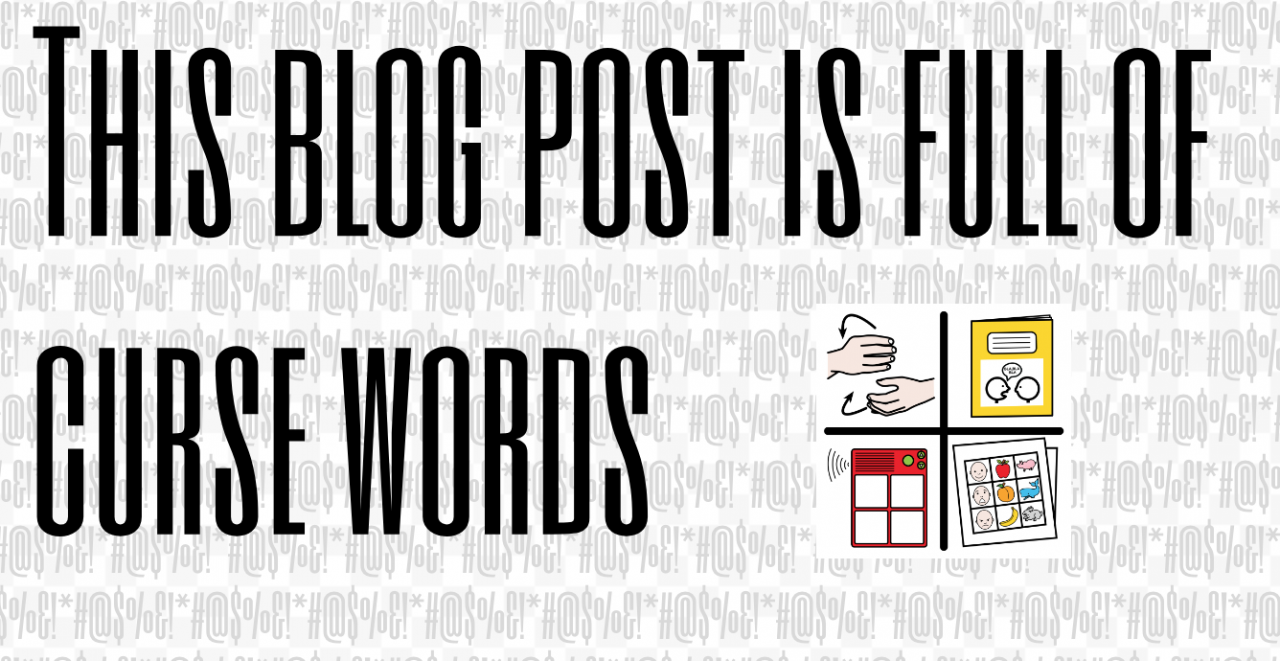- Home
- News & Networking
- Blog
- Jessica Conrad
- This Blog Post is Full of Curse Words
This Blog Post is Full of Curse Words
About once a month I have to answer a really important question:
“Why is that word on his talker?”
“That word,” is our euphemism for any number of words: body parts (slang and clinical), fart sounds, curse words, words that are culturally irrelevant, childish, or inappropriate for a child [of his age/place where he is/supposed cognitive level]. And someone, somewhere, decided to program it on this child’s Augmentative and Alternative Communication (AAC) device as if encouraging the child to use inappropriate language.
I get it. When I imagined the magical moment of helping a student find her voice with the fancy new Sound Generating Device, I wasn’t expecting her first two-word phrase on her device to be “poop butt” repeated over and over again for the next three days, either.
I get it, I really do! We’re professionals trying to create engaging and enriching environments for our learners and the literacy activity has been derailed because we taught him how to make plurals on his talker and now he loves pluralizing the word “as.”
We admit we’re impressed, but we can’t let that slide.
In moments of “enriched language” that flusters me I take a deep breath and remember:
I am not the language police.
A larger-than-anticipated part of my job has been talking about cuss words. And promoting cuss words. And explaining the functional importance of having access to cuss words. And listening to and programming cuss words into communication devices. And explaining why adults can't delete cuss words and "adult vocabulary" from a kid's voice. And listing all culturally relevant cuss words. And finding good visuals for cuss words.
If my professors could see me now.
So what happens if she talks out of turn, pressing the buttons on her communication app? The same thing that happens to all the other students talking out, of course.
What happens when she won’t stop saying “poop butt”? The same thing you would do for any other child who says it. We don’t duct tape kids mouths, and we don’t take talkers away.
What happens when she uses swear words in class? The same thing that you do for any other student who cusses in class. We can’t forcibly remove words from a speaking child’s vocabulary. We teach, we consider the variables, and we provide natural consequences. We don’t delete words from the communication device.
It is work worth doing, with clear expectations, communication between school and family (and sometimes with the office door closed and the volume down really low as you check to make sure “#$!@” is pronounced correctly). The communication device is a voice, not a school textbook or a representation of just the words you hope or anticipate they’ll use today. It’s their access to their human right to communicate, and sometimes communication is colorful, shocking, or uncomfortable.
Do you agree or disagree with me? Let me know in the comments below, with any language you like.*
*natural consequences apply
The icon AAC in my title image is from ARASAAC, a no-cost Creative Commons license resource for symbols and icons to represent all words (even “those words”).
“Why is that word on his talker?”
“That word,” is our euphemism for any number of words: body parts (slang and clinical), fart sounds, curse words, words that are culturally irrelevant, childish, or inappropriate for a child [of his age/place where he is/supposed cognitive level]. And someone, somewhere, decided to program it on this child’s Augmentative and Alternative Communication (AAC) device as if encouraging the child to use inappropriate language.
I get it. When I imagined the magical moment of helping a student find her voice with the fancy new Sound Generating Device, I wasn’t expecting her first two-word phrase on her device to be “poop butt” repeated over and over again for the next three days, either.
I get it, I really do! We’re professionals trying to create engaging and enriching environments for our learners and the literacy activity has been derailed because we taught him how to make plurals on his talker and now he loves pluralizing the word “as.”
We admit we’re impressed, but we can’t let that slide.
In moments of “enriched language” that flusters me I take a deep breath and remember:
I am not the language police.
A larger-than-anticipated part of my job has been talking about cuss words. And promoting cuss words. And explaining the functional importance of having access to cuss words. And listening to and programming cuss words into communication devices. And explaining why adults can't delete cuss words and "adult vocabulary" from a kid's voice. And listing all culturally relevant cuss words. And finding good visuals for cuss words.
If my professors could see me now.
So what happens if she talks out of turn, pressing the buttons on her communication app? The same thing that happens to all the other students talking out, of course.
What happens when she won’t stop saying “poop butt”? The same thing you would do for any other child who says it. We don’t duct tape kids mouths, and we don’t take talkers away.
What happens when she uses swear words in class? The same thing that you do for any other student who cusses in class. We can’t forcibly remove words from a speaking child’s vocabulary. We teach, we consider the variables, and we provide natural consequences. We don’t delete words from the communication device.
It is work worth doing, with clear expectations, communication between school and family (and sometimes with the office door closed and the volume down really low as you check to make sure “#$!@” is pronounced correctly). The communication device is a voice, not a school textbook or a representation of just the words you hope or anticipate they’ll use today. It’s their access to their human right to communicate, and sometimes communication is colorful, shocking, or uncomfortable.
Do you agree or disagree with me? Let me know in the comments below, with any language you like.*
*natural consequences apply
The icon AAC in my title image is from ARASAAC, a no-cost Creative Commons license resource for symbols and icons to represent all words (even “those words”).
Tags:
About the author
Jessica has been a PATINS Specialist since 2016. She has her B.A. and M.A. in Speech-Language Pathology and an M.Ed. in Learning and Technology. Jessica has a passion for literacy and language. She is the Past-President of the Indiana Division for Early Childhood, a member of ASHA SIG 12 (AAC), a Big Sister with Big Brothers Big Sisters of Central Indiana, and a novice stained glass artist.



Comments 3
I read these blog posts every week, but this one has to be my favorite! It is so true, at times hilarious and frustrating! Explaining to parents and some teachers why we don't force students to "comply", or take away their words when they make unexpected communication decisions, is very difficult for me. You've explain the concept so clearly here and it will help me speak to others in the future!
love this. Clients will find a way to make “those words” anyway like she and it! We should make a collection of client creativity in this area.
Totally agree! I have a senior that probably wants some words on his device that I never even thought of. I'm going to discuss this with him. Thanks!